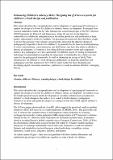| dc.contributor.author | Thompson Long, Bonnie | |
| dc.contributor.author | Hall, Tony | |
| dc.contributor.author | Hogan, Michael | |
| dc.contributor.author | Papastamatiou, Nikos | |
| dc.date.accessioned | 2017-08-09T14:14:21Z | |
| dc.date.issued | 2017-07-20 | |
| dc.identifier.citation | Thompson Long, B., Hall, T., Hogan, M., and Papastamatiou, N. (2017) Enhancing children's literacy skills: designing the Q-Tales ecosystem for children's e-book design and publication. Literacy, doi: 10.1111/lit.12128 | en_IE |
| dc.identifier.issn | 1741-4369 | |
| dc.identifier.uri | http://hdl.handle.net/10379/6688 | |
| dc.description.abstract | Digital media, interactive storytelling and e-books are ubiquitous in contemporary education, and consequently play an increasingly important role in the development of children s nascent and emergent literacy. Digital storytelling technologies are also changing rapidly and becoming more sophisticated, in terms of possibilities for creative, interactive narrative, and augmented by the capability to incorporate proven pedagogical strategies and techniques, specifically to enhance children s literacy. This raises questions around how we best design and deploy these powerful, high-potential technologies; what concepts and principles undergird the effective design of pedagogically impactful e-books for children? This paper has emerged from research undertaken within the Q-Tales international consortium project of the EU s Horizon 2020 Programme for Research and Innovation, where the aim was to facilitate key stakeholders - illustrators, storytellers, children, parents, educators, sound artists - to collaborate and participate in the online production and publication of high-quality, educational e-books for children. This paper outlines the synthesis of the Q-Tales pedagogical framework. As well as informing the design of the Q-Tales infrastructure for children s e-book design and publication, we hope the guidelines and pedagogical activities enumerated here will be widely useful for those designing and developing digital, interactive narratives, particularly e-books to enhance children s emerging literacy. | en_IE |
| dc.description.sponsorship | Research for this paper was funded by the EU's Horizon 2020 Programme for Research and Innovation | en_IE |
| dc.format | application/pdf | en_IE |
| dc.language.iso | en | en_IE |
| dc.publisher | Wiley | en_IE |
| dc.relation.ispartof | Literacy | en |
| dc.rights | Attribution-NonCommercial-NoDerivs 3.0 Ireland | |
| dc.rights.uri | https://creativecommons.org/licenses/by-nc-nd/3.0/ie/ | |
| dc.subject | e-books | en_IE |
| dc.subject | e-book design for children | en_IE |
| dc.subject | Children's literacy | en_IE |
| dc.subject | Learning design | en_IE |
| dc.subject | Education | en_IE |
| dc.title | Enhancing children's literacy skills: designing the Q-Tales ecosystem for children's e-book design and publication | en_IE |
| dc.type | Article | en_IE |
| dc.date.updated | 2017-04-27T12:19:35Z | |
| dc.identifier.doi | 10.1111/lit.12128 | |
| dc.local.publishedsource | http://dx.doi.org/10.1111/lit.12128 | en_IE |
| dc.description.peer-reviewed | peer-reviewed | |
| dc.contributor.funder | |~|1267872|~| | |
| dc.description.embargo | 2019-07-20 | |
| dc.internal.rssid | 11806202 | |
| dc.local.contact | Anthony Hall, School Of Education, Nui, Galway. 2153 Email: tony.hall@nuigalway.ie | |
| dc.local.copyrightchecked | No | |
| dc.local.version | ACCEPTED | |
| nui.item.downloads | 390 | |


